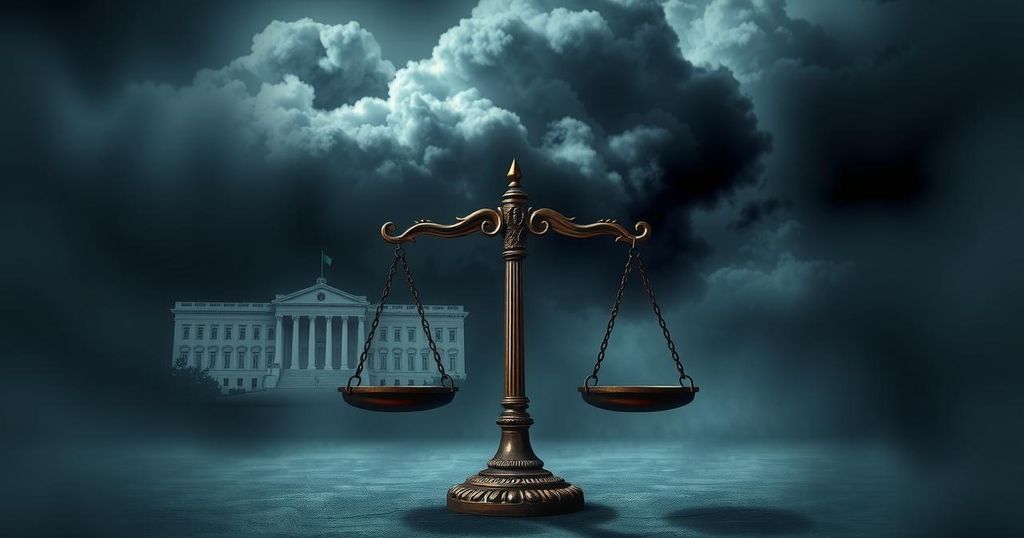The Dismemberment of Democracy in Nigeria
Under President Tinubu’s leadership, democracy in Nigeria is suffering significant setbacks marked by electoral disenfranchisement, nepotism, and a push towards a one-party state. The Independent National Electoral Commission has failed to successfully distribute voter cards, while appointments favor his ethnic group. Tinubu’s intimidation tactics against opposition and media further exacerbate concerns as the country eyes the upcoming 2027 elections, where critics urge a resistance against his consolidating power.
The current state of democracy in Nigeria appears increasingly fragile under President Bola Ahmed Tinubu’s leadership. Defined by principles of equality, accountability, and respect for the rule of law, democracy seems to be under siege in the past two years. Critics argue that the administration’s disregard for these values has resulted in significant failures across various sectors, including the economy, security, and governance.
One of the core issues plaguing the democratic process is the performance of the Independent National Electoral Commission (INEC). Established to oversee voter registration and ensure fair elections, INEC has failed to meet its obligations. The average distribution rate for Permanent Voter Cards (PVCs) remains dangerously low, with only about 30% of applicants receiving them. This not only disenfranchises millions of citizens but undermines the electoral process itself.
Furthermore, accusations of nepotism in government appointments have surfaced. The concept of Federal Character, aimed at promoting ethnic diversity in government roles, seems to have been disregarded by Tinubu. Appointments largely favor his Yoruba ethnic group, and many critics argue that they reflect a pattern of rewarding personal allies rather than prioritizing merit and fairness.
A notable instance of this nepotism includes the award of the controversial Lagos-to-Calabar Coastal Road project. Tinubu bypassed necessary legal processes, such as National Assembly approval and competitive bidding, to assign a $700 billion contract to Mr. Chagoury, a known associate. This action raises serious questions about accountability and transparency in governance.
The separation of powers, another cornerstone of democracy, appears strained under Tinubu’s administration. He has taken steps that many consider undermining the independence of the judiciary and legislative branches. Since assuming office, he has often merged the roles of various government institutions, effectively stifling checks and balances, which are essential in a democratic system.
Moreover, the political landscape has shifted ominously toward a one-party dominance. Tinubu’s administration reportedly has resorted to infiltrating opposition parties, specifically targeting the People’s Democratic Party (PDP) and the Labour Party. Allegations of establishing double agents within rival parties have surfaced, raising concerns about the manipulation and suppression of opposition.
Tinubu’s intolerance extends beyond political opponents. Journalists, civil society organizations, and activists have faced significant crackdowns. Many report threats, arrests, and harassment for merely demanding accountability from the government. A particularly notable action occurred in May 2025 when Tinubu declared himself the sole presidential candidate for the APC without broad party support, further entrenching his grip on power.
The overall narrative suggests that Tinubu’s long-term goal involves consolidating power to establish the APC as the only significant political force in Nigeria. As the nation approaches the 2027 elections, many believe this seeks to curtail the democratic rights of the populace, especially the right to choose their leaders freely.
In summary, it is imperative for citizens who value democracy and diverse political representation to stand firm against Tinubu’s apparent quest for monopolistic control over Nigeria’s political landscape. The erosion of democratic principles cannot be taken lightly, and efforts must be made to restore these values before they vanish completely.
As Nigeria gears up for the 2027 general elections, President Tinubu’s actions present serious threats to democracy. His administration’s systematic dismantling of opposition and erosion of democratic principles underline an urgent need for active resistance from the populace. Citizens must remain vigilant and advocate for their rights to ensure that democracy is upheld and that every individual’s vote counts.
Original Source: tribuneonlineng.com




Post Comment